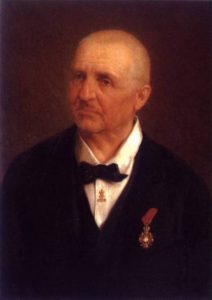 By all accounts, Austrian composer Anton Bruckner (4 September 1824 – 11 October 1896) was a strange man. Some think he was pitiable. Socially awkward.
By all accounts, Austrian composer Anton Bruckner (4 September 1824 – 11 October 1896) was a strange man. Some think he was pitiable. Socially awkward.
Surely, he was often unsure of himself to the point where he constantly revised his works.
According to the book The Essence of Bruckner by Robert Simpson,
The strange case of Anton Bruckner almost defeats the imagination. If we consider the stories of his legendary personal naivety, his primitive provincial background, his total lack of general culture, his apparent failure to grasp even moderately intelligent ideas about life, either in writing or conversation, his absurd gullibility, his helpless shyness, sometimes resulting in quite appalling obsequiousness, his curious mania for counting objects, his willingness to alter his own work aat the behest of self-appointed mentors, and many other evidences of his inadequacy in the eyes of the brilliant and often derisive intellectual circles of Vienna, we may well wonder how such a creature could have become an artist of any kind. But that he should have been the composer of works so immense, so original, and so controversial as to have aroused the highest devotion and hostility in opposite musical camps – this may seem incredible.
If you research Bruckner online, you’ll discover he had a penchant for being attracted to very young girls, yet he remained celibate and solitary his entire life.
From his entry on Wikipedia:
Anton Bruckner…was an Austrian composer known for his symphonies, masses, and motets. The first are considered emblematic of the final stage of Austro-German Romanticism because of their rich harmonic language, strongly polyphonic character, and considerable length. Bruckner’s compositions helped to define contemporary musical radicalism, owing to their dissonances, unprepared modulations, and roving harmonies.
Unlike other musical radicals such as Richard Wagner and Hugo Wolf who fit the enfant terrible mould, Bruckner showed extreme humility before other musicians, Wagner in particular. This apparent dichotomy between Bruckner the man and Bruckner the composer hampers efforts to describe his life in a way that gives a straightforward context for his music.
His works, the symphonies in particular, had detractors, most notably the influential Austrian critic Eduard Hanslick, and other supporters of Johannes Brahms who pointed to their large size and use of repetition, as well as to Bruckner’s propensity for revising many of his works, often with the assistance of colleagues, and his apparent indecision about which versions he preferred. On the other hand, Bruckner was greatly admired by subsequent composers including his friend Gustav Mahler, who described him as “half simpleton, half God”.
 And there you have it.
And there you have it.
I love that last phrase: “half simpleton, half God.”
I’ll keep that (and all of the above) in mind as I listen to Bruckner’s nine symphonies, and read the books I bought about him.
Incidentally, I used to pronounce his name to rhyme with truck. That’s not correct. It’s more akin to rhyming with brook: Brook-ner, rather than with truck: Bruck-ner.
